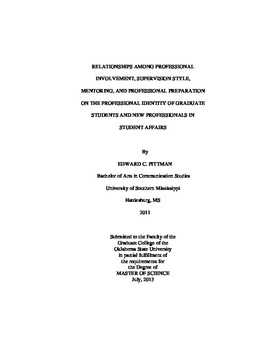| dc.contributor.advisor | Foubert, John D. | |
| dc.contributor.author | Pittman, Edward C. | |
| dc.date.accessioned | 2014-09-24T14:18:36Z | |
| dc.date.available | 2014-09-24T14:18:36Z | |
| dc.date.issued | 2013-07-01 | |
| dc.identifier.uri | https://hdl.handle.net/11244/11178 | |
| dc.description.abstract | This correlational study examined the professional identity of graduate students and new professionals in student affairs. Specifically, this study examined critical factors that influence the identity development of student affairs professionals. Professional identity was defined as the relatively stable and ingrained self-concept of beliefs, values, attributes, and experiences in terms of which people define themselves in a professional role. A basic assumption was that professional identity forms over time with different experiences and meaningful feedback that allowed people to develop insight about their core and salient preferences and values (Ibarra, 1999; Schein, 1978). A critical process in the professional identity development process of a work group is the socialization of new members (Arminio, 2011). Socialization into a profession can begin with formal training (such as graduate preparation programs); mentors; peers, supervisors, and colleagues who serve as reference groups; and membership of a professional association (Arminio, 2011). Professional identity was selected as the dependent variable to be measured in this study. Independent variables of professional involvement, supervision style, mentoring, and professional preparation were selected because they have the greatest likelihood of predicting professional identity, based on previous research. A standard multiple regression was used to determine whether and to what extent certain critical factors influenced professional identity. Two separate regressions were analyzed for graduate students and new professionals in student affairs to determine whether the identified critical factors predicted professional identity for these two groups. Results of the study show that all three critical factors significantly predict the professional identity development of graduate students. Supervision style significantly predicted the professional identity development of new student affairs professionals. Implications and recommendations for future research and student affairs practice are provided. | |
| dc.format | application/pdf | |
| dc.language | en_US | |
| dc.publisher | Oklahoma State University | |
| dc.rights | Copyright is held by the author who has granted the Oklahoma State University Library the non-exclusive right to share this material in its institutional repository. Contact Digital Library Services at lib-dls@okstate.edu or 405-744-9161 for the permission policy on the use, reproduction or distribution of this material. | |
| dc.title | Relationships Among Professional Involvement, Supervision Style, Mentoring, and Professional Preparation on the Professional Identity of Graduate Students and New Professionals in Student Affairs | |
| dc.type | text | |
| dc.contributor.committeeMember | Cole, Belinda | |
| dc.contributor.committeeMember | Mendez, Jesse P. | |
| osu.filename | Pittman_okstate_0664M_12902.pdf | |
| osu.accesstype | Open Access | |
| dc.description.department | Education | |
| dc.type.genre | Thesis | |
